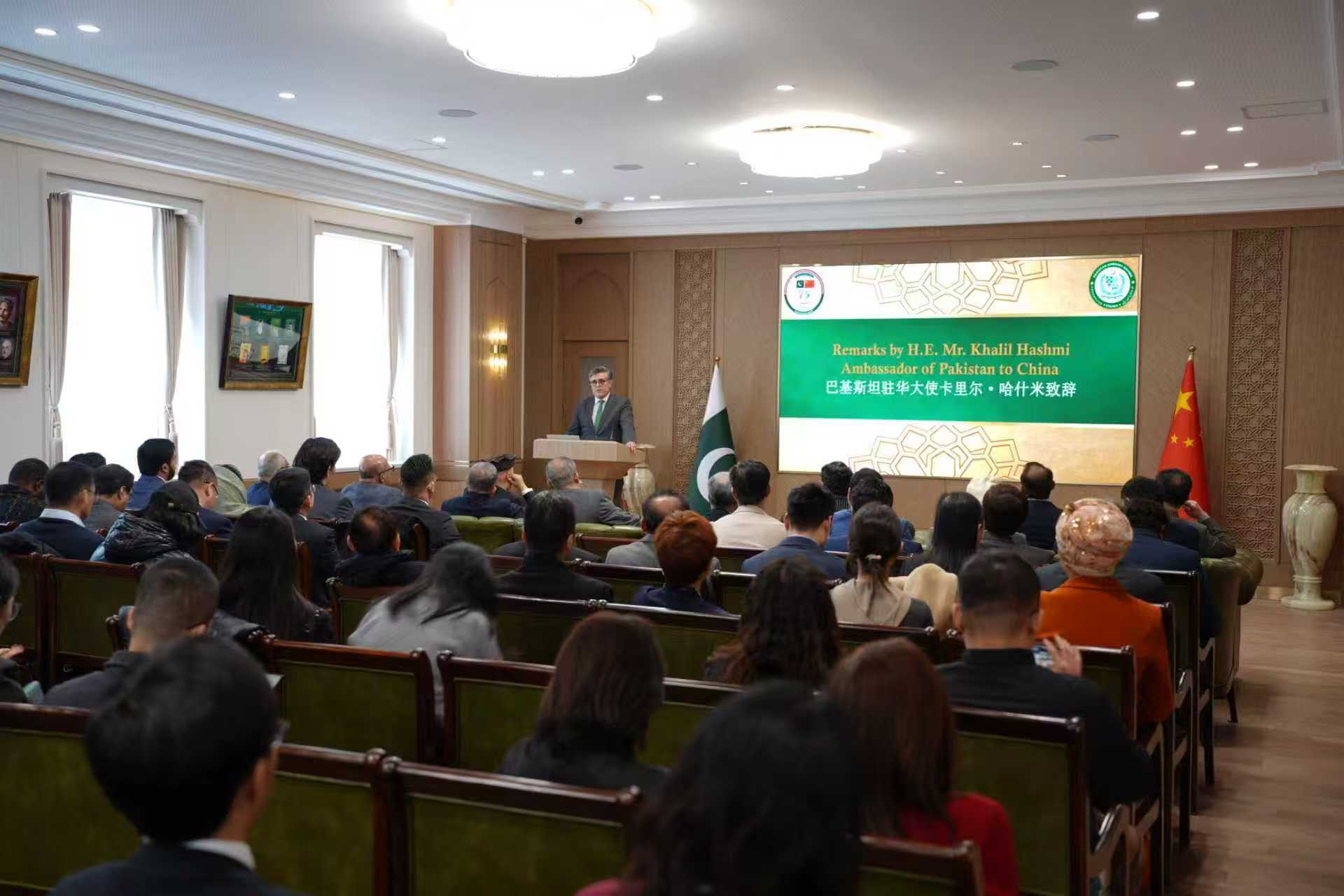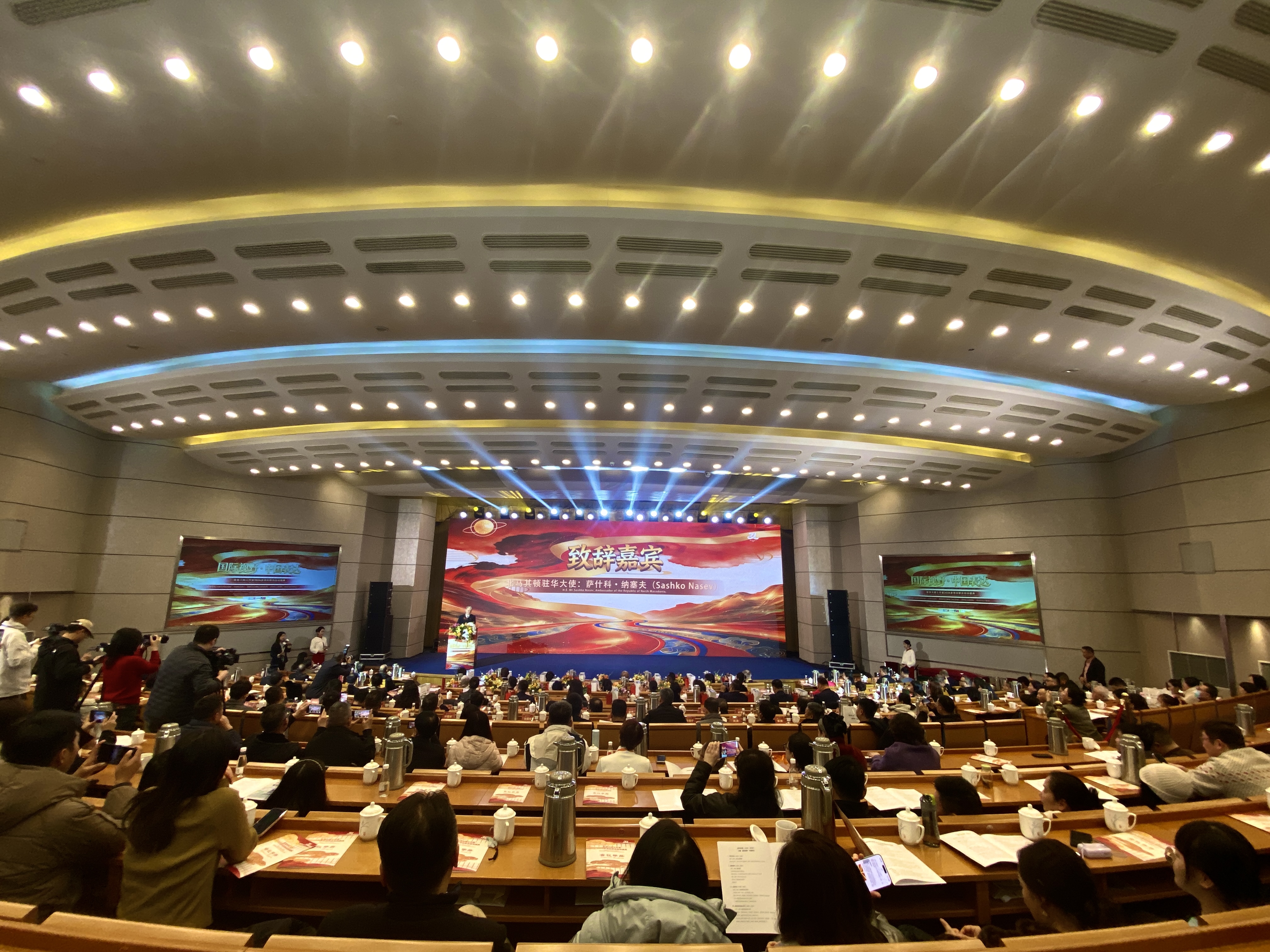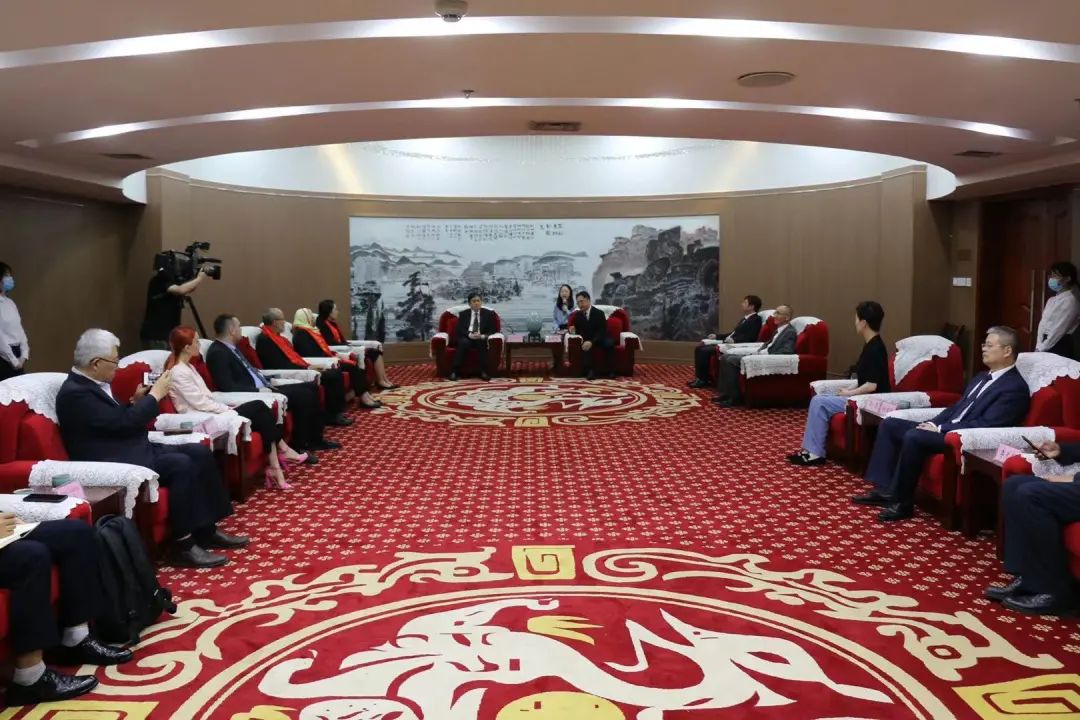Will the world avoid a dramatic change in the US response?
来源:
作者:James O’Neill* 点击:
发布时间:2020-06-10 15:45:27
Original Title:The Rise of Modern China: Will the World Avoid the Cataclysm of American Reaction?
It is an old cliché that history is written by the victors. There are ample illustrations of that point in recent western history. People of my generation, and probably others, were brought up on the myth that Christopher Columbus “discovered” what is modern day America.
Only more recently was some grudging acknowledgement given to the voyages of the Norwegian explorer Leif Erickson, who “discovered” North America several hundred years before Columbus. Unlike Columbus, Ericsson had returned home and no serious attempt was made by him or his government to lay claim to these “discovered” lands.
The verb discover is used in inverted commas for the very good reason that neither man discovered that territory. It was already occupied by people who had been there for thousands of years. They were popularly described as “Red Indians”. The fact that they were neither red nor Indian was a fact conveniently overlooked.
Far more significant than the misdescription of the origins was the consequence of European “discovery” and subsequent settlement. What occurred was possibly the greatest genocide of modern history. It has been estimated (accurate figures are extraordinarily elusive) that at least 8 million native Americans were slaughtered over a roughly 200-year period from the mid 17th century to the later 19th century when the wars finally concluded.
By then the native American population had been reduced to approximately 200,000 persons. Their original lands, that encompassed the whole of the North American continent, were reduced to a series of “reservations”. This was a euphemism that concealed the reality of deprivation and disease.
The experience of the native inhabitants of North America are useful illustration of what is a common characteristic of western history. That is, the facts are rewritten to present a narrative that is certainly untrue, but which portrays a version of history that suits modern geopolitical imperatives.
A second illustration, again, and to those who grew up in the post-World War two period, was the history of the actual war itself. Again, there is a version of events presented, particularly in the English-speaking world, that bears only a passing resemblance to what actually happened.
German conquest of western Europe was rapidly achieved. The British and their allies were defeated on the continent and effectively played only a relatively small role in North Africa and later southern Italy until the Normandy invasion of June 1944. It’s still took nearly a year for the western Allied forces to defeat what was only a fraction of the German army, liberating France and capturing a part of Germany.
The real European war was conducted between the Germans and their allies (Including a large French contingent which is conveniently ignored) against the Russians. As one indicator of the scale of the relative wars, the Russians lost more casualties in the battle for Stalingrad (just over four months from late August 1942 to early February 1943) than the combined British and American military casualties for the entire war.
This real history, as opposed to the propaganda versions repeatedly presented in the west, is finding a repetition in the current portrayal of events in Hong Kong and more generally, China itself.
To read the western mainstream media on Hong Kong one could be forgiven for thinking that it was a British bastion of democracy reluctantly, (and conditionally) handed over to the Chinese under the terms of a treaty negotiated in the 1990s between Britain and China.
To the total lack of surprise to anyone familiar with the modern history of the Wests encounters with China in recent centuries, the more recent difficulties are invariably portrayed as China being “difficult”, or “not complying with” the terms of the 1998 agreement.
In the same way as the history of the European conquest of North America, or the real carnage of World War II are presented to glorify a fictional western narrative, so too is the modern history of Hong Kong portrayed in a way to exonerate the British and demonise modern China.
Hong Kong had been an integral part of China for roughly 2000 years. In the 19th century the British fought three wars in Afghanistan which was then, as now, the world’s major producer of cocaine and its lethal by-product heroin.
From the British point of view China was a huge and lucrative market for that heroin. Having an addicted population made conquest and exploitation that much easier. Hong Kong’s role was to be the entry point for the British controlled heroin trade in China.
Unsurprisingly, the Chinese had a different view and resisted the British. They lost that first war, the Battle of Nanking, and in the 1842 Hong Kong was ceded “in perpetuity”) to Britain where it remained a colony until the 1998 handover.
It must be unique to modern history that a territory seized by a foreign power, ruled for more than a century and a half by that foreign power and then handed (reluctantly) back to its rightful owners is done so on conditions adverse to the original owners. Yet that is exactly what happened to Hong Kong.
Under the terms of the 1998 agreement (a classic illustration of unequal bargaining power) the resumption of China’s control of its own territory was to be delayed for 50 years. To call that an unequal treaty imposed on the country would hardly explain the reality.
One of the many hypocrisies in the present situation is the professed concern of the western powers, principally the United States and Britain, for the future of Hong Kong “democracy”. This is a perfect illustration, yet again, of British hypocrisy. During the 150+ years of British rule, democracy was not a characteristic of the Hong Kong government. All significant decisions were made by the Governor in accordance with his instructions from London, to whom he was solely accountable.
Hong Kong was a colony, ruled from London, with a British appointed person, the governor of Hong Kong, holding absolute power. The citizens of Hong Kong did not have the right to vote, a rather fundamental prerequisite for any territory serious about giving its citizens actual power. For the British to now express concerns about the future of Hong Kong’s democracy is a perfect illustration of that phenomena forever equated with the British, hypocrisy.
In recent months we have witnessed a minor Civil War being waged in Hong Kong. Bands of western supported and financed terrorist groups have staged violent protests against the Hong Kong government. The equation between destroying property and assaulting citizens all the one hand, and protecting “Hong Kong democracy” on the other hand, has never been clear.
More accurately, the present civil unrest is organised and financed by United States and British elements who see it as a means of embarrassing the Chinese government. The Americans have now eliminated the tariff preferences they offered to Hong Kong industry, and the British have suggested that disgruntled Hong Kong citizens could emigrate to the United Kingdom and their loyal acolytes such as Australia.
Australia’s history in this regard would hardly inspire confidence among Hong Kong emigrants That they would be better off taking their chances in a country whose anti-China rhetoric increases by the day and whose history in the treatment of its own indigenous citizens similarly inspires no confidence at all and is devoid of logic.
The reality of Hong Kong is rather different from the portrayal given by the western media. At the time of the handover in 1998 Hong Kong represented a far greater proportion of the Chinese economy that is true 22 years later. Its economic importance has shrunk to being a very small part of the total Chinese economy. The latter has outperformed the western nations in economic growth for at least the last two decades.
In terms of parity purchasing power, a vastly superior measure than gross domestic product, China became the world’s number one economic power a decade ago. Unlike the West, that economic power has been utilised in two significant ways.
The first is that the standard of living of ordinary Chinese people has been vastly enhanced, with more than 700 million people lifted into the middle class in the past two decades. That is an achievement unparalleled by any western power in modern history. For the United States, whose propaganda is replete with references to itself as the world’s greatest economic and military power, the economic reality is something they do not recognise, let alone accept.
The second way in which China’s modern power has been expressed is its creation of what is now known as the Belt and Road Initiative. This is a project that now encompasses 150 nations, including member states of the European Union, as well as countries in Latin America, Africa, the Middle East and Asia.
This is the greatest infrastructure program in history and has already, after only five years of activity, brought immense benefit to a vast range of countries and hundreds of millions of people. Unsurprisingly, it has been seen as a threat to the western economic dominance of the past 300 years.
The reaction of a few western countries, including the United States and Australia, has been to portray the BRI is a threat to the independence of the participating nations. They are seen as potential victims of Chinese dominance.
Apart from the absence of any evidence of a Chinese takeover of multiple countries and their economies it actually says more about the mentality of the projects opponents than it does about modern reality. The western nations, and in particular the United States, have used their economic and military power in the post-World War Two period to enforce their version of “democracy” and development upon a huge number of countries.
Since the end of World War Two the United States and its allies have attacked, invaded, and overthrown the governments of more than 70 nations. The United States has more than 800 military bases around the world, nearly half of which have as their military objective the threatening of China.
To accuse China of having similar ambitions is a classic illustration of what the psychologists call projection, i.e. attributing to others what one does oneself. The reality is that the United States sees the rising economic and political power of China as a threat to its lawless hegemony that it has foisted upon the world for the past seven decades. That an increasing number of nations neither approve nor accept such behaviour is represented in part by their willingness to participate in the BRI, notwithstanding the relentless propaganda against that venture by the United States and its allies.
In reality, what we are witnessing is a return to Asian predominance of the world that was true until the historical aberration of European-United States dominance of the past 300 years. That reversion is not without its risks as the United States is unlikely to willingly concede that its era of dominance is rapidly drawing to a close. Therein lies the greatest threat to world peace and stability, and the greatest threat to nations who seek a better future for their people.
*Barrister at law and geopolitical analyst. He may be contacted at joneill@qldbar.asn.au
Only more recently was some grudging acknowledgement given to the voyages of the Norwegian explorer Leif Erickson, who “discovered” North America several hundred years before Columbus. Unlike Columbus, Ericsson had returned home and no serious attempt was made by him or his government to lay claim to these “discovered” lands.
The verb discover is used in inverted commas for the very good reason that neither man discovered that territory. It was already occupied by people who had been there for thousands of years. They were popularly described as “Red Indians”. The fact that they were neither red nor Indian was a fact conveniently overlooked.
Far more significant than the misdescription of the origins was the consequence of European “discovery” and subsequent settlement. What occurred was possibly the greatest genocide of modern history. It has been estimated (accurate figures are extraordinarily elusive) that at least 8 million native Americans were slaughtered over a roughly 200-year period from the mid 17th century to the later 19th century when the wars finally concluded.
By then the native American population had been reduced to approximately 200,000 persons. Their original lands, that encompassed the whole of the North American continent, were reduced to a series of “reservations”. This was a euphemism that concealed the reality of deprivation and disease.
The experience of the native inhabitants of North America are useful illustration of what is a common characteristic of western history. That is, the facts are rewritten to present a narrative that is certainly untrue, but which portrays a version of history that suits modern geopolitical imperatives.
A second illustration, again, and to those who grew up in the post-World War two period, was the history of the actual war itself. Again, there is a version of events presented, particularly in the English-speaking world, that bears only a passing resemblance to what actually happened.
German conquest of western Europe was rapidly achieved. The British and their allies were defeated on the continent and effectively played only a relatively small role in North Africa and later southern Italy until the Normandy invasion of June 1944. It’s still took nearly a year for the western Allied forces to defeat what was only a fraction of the German army, liberating France and capturing a part of Germany.
The real European war was conducted between the Germans and their allies (Including a large French contingent which is conveniently ignored) against the Russians. As one indicator of the scale of the relative wars, the Russians lost more casualties in the battle for Stalingrad (just over four months from late August 1942 to early February 1943) than the combined British and American military casualties for the entire war.
This real history, as opposed to the propaganda versions repeatedly presented in the west, is finding a repetition in the current portrayal of events in Hong Kong and more generally, China itself.
To read the western mainstream media on Hong Kong one could be forgiven for thinking that it was a British bastion of democracy reluctantly, (and conditionally) handed over to the Chinese under the terms of a treaty negotiated in the 1990s between Britain and China.
To the total lack of surprise to anyone familiar with the modern history of the Wests encounters with China in recent centuries, the more recent difficulties are invariably portrayed as China being “difficult”, or “not complying with” the terms of the 1998 agreement.
In the same way as the history of the European conquest of North America, or the real carnage of World War II are presented to glorify a fictional western narrative, so too is the modern history of Hong Kong portrayed in a way to exonerate the British and demonise modern China.
Hong Kong had been an integral part of China for roughly 2000 years. In the 19th century the British fought three wars in Afghanistan which was then, as now, the world’s major producer of cocaine and its lethal by-product heroin.
From the British point of view China was a huge and lucrative market for that heroin. Having an addicted population made conquest and exploitation that much easier. Hong Kong’s role was to be the entry point for the British controlled heroin trade in China.
Unsurprisingly, the Chinese had a different view and resisted the British. They lost that first war, the Battle of Nanking, and in the 1842 Hong Kong was ceded “in perpetuity”) to Britain where it remained a colony until the 1998 handover.
It must be unique to modern history that a territory seized by a foreign power, ruled for more than a century and a half by that foreign power and then handed (reluctantly) back to its rightful owners is done so on conditions adverse to the original owners. Yet that is exactly what happened to Hong Kong.
Under the terms of the 1998 agreement (a classic illustration of unequal bargaining power) the resumption of China’s control of its own territory was to be delayed for 50 years. To call that an unequal treaty imposed on the country would hardly explain the reality.
One of the many hypocrisies in the present situation is the professed concern of the western powers, principally the United States and Britain, for the future of Hong Kong “democracy”. This is a perfect illustration, yet again, of British hypocrisy. During the 150+ years of British rule, democracy was not a characteristic of the Hong Kong government. All significant decisions were made by the Governor in accordance with his instructions from London, to whom he was solely accountable.
Hong Kong was a colony, ruled from London, with a British appointed person, the governor of Hong Kong, holding absolute power. The citizens of Hong Kong did not have the right to vote, a rather fundamental prerequisite for any territory serious about giving its citizens actual power. For the British to now express concerns about the future of Hong Kong’s democracy is a perfect illustration of that phenomena forever equated with the British, hypocrisy.
In recent months we have witnessed a minor Civil War being waged in Hong Kong. Bands of western supported and financed terrorist groups have staged violent protests against the Hong Kong government. The equation between destroying property and assaulting citizens all the one hand, and protecting “Hong Kong democracy” on the other hand, has never been clear.
More accurately, the present civil unrest is organised and financed by United States and British elements who see it as a means of embarrassing the Chinese government. The Americans have now eliminated the tariff preferences they offered to Hong Kong industry, and the British have suggested that disgruntled Hong Kong citizens could emigrate to the United Kingdom and their loyal acolytes such as Australia.
Australia’s history in this regard would hardly inspire confidence among Hong Kong emigrants That they would be better off taking their chances in a country whose anti-China rhetoric increases by the day and whose history in the treatment of its own indigenous citizens similarly inspires no confidence at all and is devoid of logic.
The reality of Hong Kong is rather different from the portrayal given by the western media. At the time of the handover in 1998 Hong Kong represented a far greater proportion of the Chinese economy that is true 22 years later. Its economic importance has shrunk to being a very small part of the total Chinese economy. The latter has outperformed the western nations in economic growth for at least the last two decades.
In terms of parity purchasing power, a vastly superior measure than gross domestic product, China became the world’s number one economic power a decade ago. Unlike the West, that economic power has been utilised in two significant ways.
The first is that the standard of living of ordinary Chinese people has been vastly enhanced, with more than 700 million people lifted into the middle class in the past two decades. That is an achievement unparalleled by any western power in modern history. For the United States, whose propaganda is replete with references to itself as the world’s greatest economic and military power, the economic reality is something they do not recognise, let alone accept.
The second way in which China’s modern power has been expressed is its creation of what is now known as the Belt and Road Initiative. This is a project that now encompasses 150 nations, including member states of the European Union, as well as countries in Latin America, Africa, the Middle East and Asia.
This is the greatest infrastructure program in history and has already, after only five years of activity, brought immense benefit to a vast range of countries and hundreds of millions of people. Unsurprisingly, it has been seen as a threat to the western economic dominance of the past 300 years.
The reaction of a few western countries, including the United States and Australia, has been to portray the BRI is a threat to the independence of the participating nations. They are seen as potential victims of Chinese dominance.
Apart from the absence of any evidence of a Chinese takeover of multiple countries and their economies it actually says more about the mentality of the projects opponents than it does about modern reality. The western nations, and in particular the United States, have used their economic and military power in the post-World War Two period to enforce their version of “democracy” and development upon a huge number of countries.
Since the end of World War Two the United States and its allies have attacked, invaded, and overthrown the governments of more than 70 nations. The United States has more than 800 military bases around the world, nearly half of which have as their military objective the threatening of China.
To accuse China of having similar ambitions is a classic illustration of what the psychologists call projection, i.e. attributing to others what one does oneself. The reality is that the United States sees the rising economic and political power of China as a threat to its lawless hegemony that it has foisted upon the world for the past seven decades. That an increasing number of nations neither approve nor accept such behaviour is represented in part by their willingness to participate in the BRI, notwithstanding the relentless propaganda against that venture by the United States and its allies.
In reality, what we are witnessing is a return to Asian predominance of the world that was true until the historical aberration of European-United States dominance of the past 300 years. That reversion is not without its risks as the United States is unlikely to willingly concede that its era of dominance is rapidly drawing to a close. Therein lies the greatest threat to world peace and stability, and the greatest threat to nations who seek a better future for their people.
*Barrister at law and geopolitical analyst. He may be contacted at joneill@qldbar.asn.au
现代中国的崛起:世界会避免美国反应的剧变吗?
历史是胜利者书写的,这是老生常谈。在近代西方历史中,有大量例证说明了这一点。我们这一代人,可能还有其他人,都是在克里斯托弗·哥伦布“发现”现代美洲的神话中长大的。
直到最近,人们才勉强承认挪威探险家利夫·埃里克森的航行,他比哥伦布早几百年“发现”了北美洲。与哥伦布不同,埃里克森已经回家,他或他的政府没有认真尝试对这些“发现”的土地提出权利主张。
动词discover用在引号中,理由很充分,两个人都没有发现那个领域。它已经被在那里生活了几千年的人占据了。他们被普遍描述为“红色印第安人”。他们既不是红色也不是印度人,这一事实很容易被忽视。
远比对起源的错误描述更重要的是欧洲“发现”和随后定居的结果。所发生的可能是现代史上最大的种族灭绝。据估计(准确的数字非常难以捉摸),从17世纪中期到19世纪后期战争最终结束的大约200年间,至少有800万美国土著被屠杀。 到那时,美洲土著人口已经减少到大约20万人。他们的原始土地,包括整个北美大陆,被缩减为一系列的“保留地”。这是一种委婉的说法,掩盖了贫困和疾病的现实。
北美土著居民的经历是西方历史的一个共同特征的有益说明。也就是说,事实被改写,呈现出一种叙述,这种叙述肯定是不真实的,但它描绘了一种符合现代地缘政治需要的历史版本。 第二个例子,对于那些在二战后成长起来的人来说,是真实战争本身的历史。同样,有一个事件的版本,特别是在说英语的世界里,与实际发生的事情只有短暂的相似之处。 德国对西欧的征服很快实现了。
在1944年6月诺曼底入侵之前,英国及其盟友在非洲大陆被击败,在北非和后来的意大利南部实际上只发挥了相对较小的作用。西方盟军仍然花了将近一年的时间才打败了德国军队的一小部分,解放了法国,并占领了德国的一部分。
真正的欧洲战争是在德国人和他们的盟友(包括一个被轻易忽略的法国特遣队)之间针对俄罗斯人进行的。作为相对战争规模的一个指标,俄国人在斯大林格勒战役中(从1942年8月下旬到1943年2月上旬的四个多月时间里)损失的伤亡人数比整个战争中英美军队的总伤亡人数还要多。 这一真实的历史,与西方反复呈现的宣传版本相反,在当前对香港事件的描述中,以及更广泛地说,在对中国本身的描述中,找到了一种重复。
阅读西方主流媒体对香港的报道,人们可能会认为,根据上世纪90年代中英谈判达成的一项条约,香港是英国不情愿地(有条件地)移交给中国的民主堡垒,这是情有可原的。 对于任何熟悉西方现代历史的人来说,最近几个世纪与中国的遭遇都不足为奇,最近的困难总是被描述为中国“困难重重”,或“不遵守”1998年协议的条款。正如欧洲征服北美的历史或二战的真实大屠杀被用来美化一个虚构的西方故事一样,香港的现代史也是以一种为英国开脱并妖魔化现代中国的方式来描绘的。
大约2000年来,香港一直是中国不可分割的一部分。19世纪,英国在阿富汗打了三场战争,当时和现在一样,阿富汗是世界上可卡因及其致命副产品海洛因的主要生产国。 从英国的角度来看,中国是一个巨大且利润丰厚的海洛因市场。上瘾的人口使得征服和剥削变得容易多了。香港的角色是成为英国控制的中国海洛因贸易的入境点。 不出所料,中国人持不同观点,抵制英国人。他们输掉了第一次战争——南京战役,1842年香港被“永久”割让给英国,在1998年回归前,香港一直是英国的殖民地。
一个被外国占领的领土,被外国统治了一个半世纪,然后(不情愿地)归还给它的合法拥有者,是在不利于原始拥有者的条件下进行的,这一定是现代历史所独有的。然而,这正是香港的情况。 根据1998年协议的条款(不平等谈判权的典型例证),中国恢复对自己领土的控制将被推迟50年。称强加于该国的不平等条约难以解释现实。 目前情况的众多虚伪之一,是西方列强,主要是美国和英国,声称关心香港“民主”的未来。这再次完美地说明了英国的虚伪。
在英国统治的150多年里,民主不是香港政府的特征。所有重要的决定都是由总督根据伦敦的指示作出的,他只对伦敦负责。 香港是一个殖民地,由伦敦统治,由英国任命的香港总督掌握绝对权力。香港公民没有投票权,这是任何一个领土应该赋予其公民实际权力的一个相当基本的先决条件。英国人现在对香港民主的未来表示关切,这是一个很好的例子,说明这种现象永远等同于英国人的虚伪。
最近几个月,我们目睹了一场小规模的内战在香港爆发。西方支持和资助的恐怖组织发起来了针对香港政府的暴力抗议。一方面摧毁财产和袭击公民,另一方面保护“香港民主”,这两者之间的关系从来就不明确。 更准确地说,目前的内乱是由美国和英国组织和资助的,他们认为这是让中国政府难堪的一种手段。美国人现在取消了对香港工业的关税优惠,而英国人则建议心怀不满的香港公民可以移民到英国和他们忠实的助手如澳大利亚。 澳大利亚在这方面的历史很难激发香港移民的信心,即他们最好在一个反中国言论日益增多、其对待本国土著公民的历史同样没有引起任何信心和缺乏逻辑的国家抓住机会。
香港的现实与西方媒体的描述大相径庭。1998年香港回归时,香港在中国经济中所占的比重要大得多;22年后它的经济重要性已经缩小到只占中国经济总量的很小一部分。至少在过去20年里,后者的经济增长超过了西方国家。 就购买力平价而言,这是一个远远优于国内生产总值的指标,十年前,中国成为世界第一大经济强国。
与西方不同,这种经济力量被用在两个重要方面。 首先,普通中国人的生活水平已经大大提高,在过去的20年里,超过7亿人进入了中产阶级。这是现代史上任何西方强国都无法比拟的成就。对美国来说,其宣传充满了对自己作为世界上最大的经济和军事力量的提及,经济现实是他们不承认的,更不用说接受了。
中国现代力量的第二种表现方式是它创造了现在被称为“一带一路”的倡议。这是一个现在包含150个国家的项目,包括欧洲联盟成员国,以及拉丁美洲、非洲、中东和亚洲国家。 这是有史以来最大的基础设施项目,仅在五年的活动之后,就已经给广大国家和亿万人民带来了巨大的利益。毫不奇怪,这被视为对过去300年西方经济主导地位的威胁。 包括美国和澳大利亚在内的一些西方国家的反应是,把一带一路描绘成是对参与国独立的威胁。他们被视为中国主导地位的潜在受害者。
除了没有任何证据表明中国接管了多个国家及其经济之外,它实际上更多地反映了项目反对者的心态,而不是现代现实。西方国家,尤其是美国,在第二次世界大战后时期利用其经济和军事力量,在许多国家推行他们的“民主”和发展。
自第二次世界大战结束以来,美国及其盟国攻击、入侵并推翻了70多个国家的政府。美国在世界各地有800多个军事基地,其中近一半的军事目标是威胁中国。 指责中国有类似的野心是心理学家所谓的投射的经典例证,即把自己的所作所为归因于他人。现实是,美国将中国不断上升的经济和政治实力视为对其无法无天的霸权的威胁,这种霸权是美国在过去70年强加给世界的。越来越多的国家既不赞成也不接受这种行为,部分原因是它们愿意参与一带一路事务,尽管美国及其盟国一直在进行反对这种冒险的宣传。
事实上,我们正在目睹的是亚洲重新主导世界,这种情况一直持续到过去300年欧洲-美国主导的历史反常。这种逆转并非没有风险,因为美国不太可能心甘情愿地承认其主导时代正在迅速接近尾声。这是对世界和平与稳定的最大威胁,也是对为人民寻求美好未来国家的最大威胁。
(作者是律师和政治分析师 James O’Neill)
(责任编辑:James O’Neill*)
直到最近,人们才勉强承认挪威探险家利夫·埃里克森的航行,他比哥伦布早几百年“发现”了北美洲。与哥伦布不同,埃里克森已经回家,他或他的政府没有认真尝试对这些“发现”的土地提出权利主张。
动词discover用在引号中,理由很充分,两个人都没有发现那个领域。它已经被在那里生活了几千年的人占据了。他们被普遍描述为“红色印第安人”。他们既不是红色也不是印度人,这一事实很容易被忽视。
远比对起源的错误描述更重要的是欧洲“发现”和随后定居的结果。所发生的可能是现代史上最大的种族灭绝。据估计(准确的数字非常难以捉摸),从17世纪中期到19世纪后期战争最终结束的大约200年间,至少有800万美国土著被屠杀。 到那时,美洲土著人口已经减少到大约20万人。他们的原始土地,包括整个北美大陆,被缩减为一系列的“保留地”。这是一种委婉的说法,掩盖了贫困和疾病的现实。
北美土著居民的经历是西方历史的一个共同特征的有益说明。也就是说,事实被改写,呈现出一种叙述,这种叙述肯定是不真实的,但它描绘了一种符合现代地缘政治需要的历史版本。 第二个例子,对于那些在二战后成长起来的人来说,是真实战争本身的历史。同样,有一个事件的版本,特别是在说英语的世界里,与实际发生的事情只有短暂的相似之处。 德国对西欧的征服很快实现了。
在1944年6月诺曼底入侵之前,英国及其盟友在非洲大陆被击败,在北非和后来的意大利南部实际上只发挥了相对较小的作用。西方盟军仍然花了将近一年的时间才打败了德国军队的一小部分,解放了法国,并占领了德国的一部分。
真正的欧洲战争是在德国人和他们的盟友(包括一个被轻易忽略的法国特遣队)之间针对俄罗斯人进行的。作为相对战争规模的一个指标,俄国人在斯大林格勒战役中(从1942年8月下旬到1943年2月上旬的四个多月时间里)损失的伤亡人数比整个战争中英美军队的总伤亡人数还要多。 这一真实的历史,与西方反复呈现的宣传版本相反,在当前对香港事件的描述中,以及更广泛地说,在对中国本身的描述中,找到了一种重复。
阅读西方主流媒体对香港的报道,人们可能会认为,根据上世纪90年代中英谈判达成的一项条约,香港是英国不情愿地(有条件地)移交给中国的民主堡垒,这是情有可原的。 对于任何熟悉西方现代历史的人来说,最近几个世纪与中国的遭遇都不足为奇,最近的困难总是被描述为中国“困难重重”,或“不遵守”1998年协议的条款。正如欧洲征服北美的历史或二战的真实大屠杀被用来美化一个虚构的西方故事一样,香港的现代史也是以一种为英国开脱并妖魔化现代中国的方式来描绘的。
大约2000年来,香港一直是中国不可分割的一部分。19世纪,英国在阿富汗打了三场战争,当时和现在一样,阿富汗是世界上可卡因及其致命副产品海洛因的主要生产国。 从英国的角度来看,中国是一个巨大且利润丰厚的海洛因市场。上瘾的人口使得征服和剥削变得容易多了。香港的角色是成为英国控制的中国海洛因贸易的入境点。 不出所料,中国人持不同观点,抵制英国人。他们输掉了第一次战争——南京战役,1842年香港被“永久”割让给英国,在1998年回归前,香港一直是英国的殖民地。
一个被外国占领的领土,被外国统治了一个半世纪,然后(不情愿地)归还给它的合法拥有者,是在不利于原始拥有者的条件下进行的,这一定是现代历史所独有的。然而,这正是香港的情况。 根据1998年协议的条款(不平等谈判权的典型例证),中国恢复对自己领土的控制将被推迟50年。称强加于该国的不平等条约难以解释现实。 目前情况的众多虚伪之一,是西方列强,主要是美国和英国,声称关心香港“民主”的未来。这再次完美地说明了英国的虚伪。
在英国统治的150多年里,民主不是香港政府的特征。所有重要的决定都是由总督根据伦敦的指示作出的,他只对伦敦负责。 香港是一个殖民地,由伦敦统治,由英国任命的香港总督掌握绝对权力。香港公民没有投票权,这是任何一个领土应该赋予其公民实际权力的一个相当基本的先决条件。英国人现在对香港民主的未来表示关切,这是一个很好的例子,说明这种现象永远等同于英国人的虚伪。
最近几个月,我们目睹了一场小规模的内战在香港爆发。西方支持和资助的恐怖组织发起来了针对香港政府的暴力抗议。一方面摧毁财产和袭击公民,另一方面保护“香港民主”,这两者之间的关系从来就不明确。 更准确地说,目前的内乱是由美国和英国组织和资助的,他们认为这是让中国政府难堪的一种手段。美国人现在取消了对香港工业的关税优惠,而英国人则建议心怀不满的香港公民可以移民到英国和他们忠实的助手如澳大利亚。 澳大利亚在这方面的历史很难激发香港移民的信心,即他们最好在一个反中国言论日益增多、其对待本国土著公民的历史同样没有引起任何信心和缺乏逻辑的国家抓住机会。
香港的现实与西方媒体的描述大相径庭。1998年香港回归时,香港在中国经济中所占的比重要大得多;22年后它的经济重要性已经缩小到只占中国经济总量的很小一部分。至少在过去20年里,后者的经济增长超过了西方国家。 就购买力平价而言,这是一个远远优于国内生产总值的指标,十年前,中国成为世界第一大经济强国。
与西方不同,这种经济力量被用在两个重要方面。 首先,普通中国人的生活水平已经大大提高,在过去的20年里,超过7亿人进入了中产阶级。这是现代史上任何西方强国都无法比拟的成就。对美国来说,其宣传充满了对自己作为世界上最大的经济和军事力量的提及,经济现实是他们不承认的,更不用说接受了。
中国现代力量的第二种表现方式是它创造了现在被称为“一带一路”的倡议。这是一个现在包含150个国家的项目,包括欧洲联盟成员国,以及拉丁美洲、非洲、中东和亚洲国家。 这是有史以来最大的基础设施项目,仅在五年的活动之后,就已经给广大国家和亿万人民带来了巨大的利益。毫不奇怪,这被视为对过去300年西方经济主导地位的威胁。 包括美国和澳大利亚在内的一些西方国家的反应是,把一带一路描绘成是对参与国独立的威胁。他们被视为中国主导地位的潜在受害者。
除了没有任何证据表明中国接管了多个国家及其经济之外,它实际上更多地反映了项目反对者的心态,而不是现代现实。西方国家,尤其是美国,在第二次世界大战后时期利用其经济和军事力量,在许多国家推行他们的“民主”和发展。
自第二次世界大战结束以来,美国及其盟国攻击、入侵并推翻了70多个国家的政府。美国在世界各地有800多个军事基地,其中近一半的军事目标是威胁中国。 指责中国有类似的野心是心理学家所谓的投射的经典例证,即把自己的所作所为归因于他人。现实是,美国将中国不断上升的经济和政治实力视为对其无法无天的霸权的威胁,这种霸权是美国在过去70年强加给世界的。越来越多的国家既不赞成也不接受这种行为,部分原因是它们愿意参与一带一路事务,尽管美国及其盟国一直在进行反对这种冒险的宣传。
事实上,我们正在目睹的是亚洲重新主导世界,这种情况一直持续到过去300年欧洲-美国主导的历史反常。这种逆转并非没有风险,因为美国不太可能心甘情愿地承认其主导时代正在迅速接近尾声。这是对世界和平与稳定的最大威胁,也是对为人民寻求美好未来国家的最大威胁。
(作者是律师和政治分析师 James O’Neill)
版权及免责声明
1、本网转载媒体稿件旨在传播更多有益信息,并不代表同意该观点,本网不承担稿件侵权行为的连带责任;
2、在本网博客/论坛发表言论者,文责自负。
推荐文章
热点内容
-
 查谟和克什米尔历史与现状研讨会在
2026年2月5日,巴基斯坦驻华使馆举办“查谟和克什米尔历史与现状研讨会”,巴基斯坦使馆外交官和数十位中外学者出席。使馆工作人员首先宣读了巴基斯坦总理夏巴兹·谢
查谟和克什米尔历史与现状研讨会在
2026年2月5日,巴基斯坦驻华使馆举办“查谟和克什米尔历史与现状研讨会”,巴基斯坦使馆外交官和数十位中外学者出席。使馆工作人员首先宣读了巴基斯坦总理夏巴兹·谢
-
 CECTV《声起东方》全球中文经
制片主任:李敏
CECTV《声起东方》全球中文经
制片主任:李敏
- ・《少林点穴的隐秘力量》纪录片在郑州圆满杀青
- ・2025GT世界挑战赛北京亦庄站启幕
- ・北京市侨联召开海外北京会座谈交流会
- ・2025GT世界挑战赛北京亦庄站圆满落幕
- ・短片【未封存的岁月日记】的时代意义
- ・侨智未来·创新人才发展活动举办
- ・2025GT世界挑战赛北京亦庄站筹备进入冲刺阶段
- ・无锡味道 世界共享LA LISTE 2025全球美食
- ・2025“校园星主播”国际展演(韩国站)圆满结束
- ・“勇气少年团”综艺节目开始选拨啦
- ・CECTV《声起东方》全球中文经典朗读节目
- ・美国迈阿密大学访问学者项目
- ・2012第二届中国国际积极心理学大会
- ・首届世界香具文化大会暨高峰论坛在浙江龙泉圆满召开
最新文章
- ・查谟和克什米尔历史与现状研讨会在京举行
- ・时隔33年重聚首!英达携《我爱我家》原班人马打造新剧
- ・暖意初萌,蓄势而生,国共两党智库论坛在立春时节举办恰
- ・张录工作室2026多项目联合计划在杭启幕 构建文化出
- ・AI漫剧人才评价标准研讨会在京举行
- ・百集电视访谈栏目《健康大讲堂》----磷虾油与健康第
- ・百集电视访谈栏目《健康大讲堂》----特医食品与健康
- ・“汇聚力量·点燃希望”大手牵小手“我和星宝过大年”暨
- ・古巴民族英雄何塞·马蒂诞辰173周年暨菲德尔·卡斯特
- ・以象为维 医艺新章
- ・CECTV《声起东方》全球中文经典朗读节目
- ・“勇气少年团”综艺节目开始选拨啦
- ・2025“校园星主播”国际展演(韩国站)圆满结束
- ・首届世界香具文化大会暨高峰论坛在浙江龙泉圆满召开
- ・2012第二届中国国际积极心理学大会
- ・美国迈阿密大学访问学者项目









